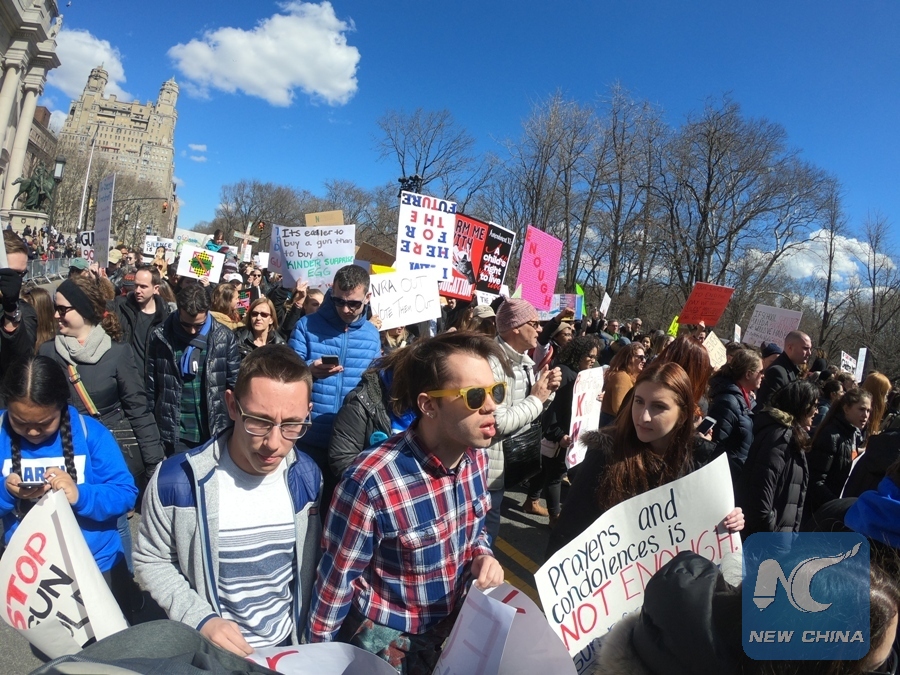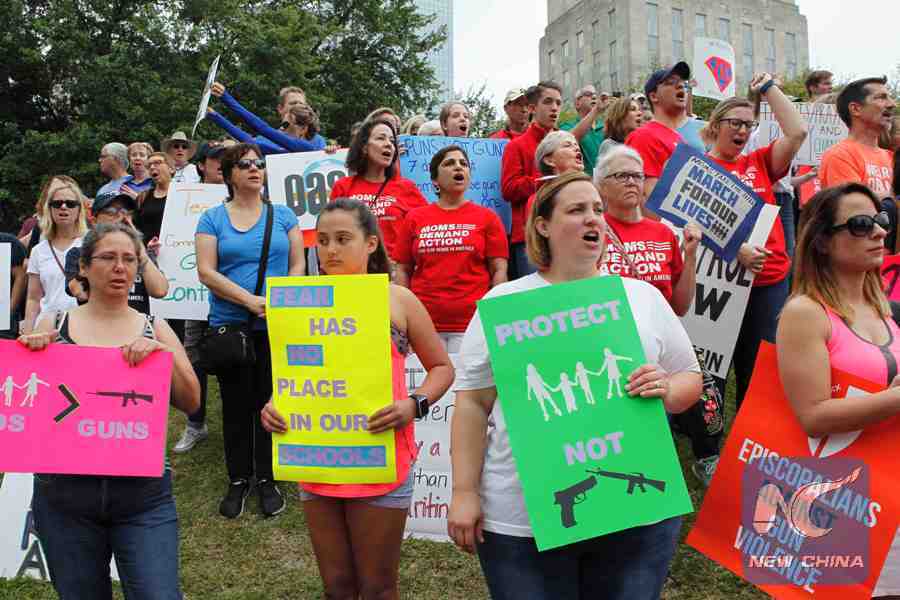
Thousands of people in U.S. New York City join the nationwide "March For Our Lives" protest against gun violence on March 24, 2018. (Xinhua/Zhang Mocheng)
NEW YORK, March 24 (Xinhua) -- Braving the chilly weather on Saturday morning, thousands of teenagers,teachers and parents in New York took to the streets in their support for a nationwide students march calling the U.S. Congress to pass tighter gun-control laws.
The New York "March For Our Lives" began with a rally at near the Central Park during which a moment of silence was observed as the names of 17 victims killed in the school shooting in Parkland, Florida, were read.
Then the protesters, holding signs including "Enough is Enough" "We're the Change" "Gun violence hurts" and "I am a Teacher NOT a Security Guard," walked all the way to the midtown Mahattan.
"I am marching for kids in school, I hope they get protected and don't have to worry about being shot in school," Daisy Rymer, a university student from New Orleans, told Xinhua as she and her friends started to move with the crowds from the Central Park West aveune.

Hundreds of thousands of people join the nationwide "March For Our Lives" protest against gun violence in Houston, Texas, the United States, on March 24, 2018. (Xinhua/Song Qiong)
THIS TIME IT FEELS DIFFERENT
The U.S. teenager activists are building a momentum for a gun-control campaign many experts say their parents generation failed to make it.
More than 800 other events were reported held across the United States, with hundreds of cities participating on Saturday. Marches were planned in Washington, D.C., Los Angeles, Boston, Houston, Philadelphia, New York City, and Parkland, Florida.
A half million marchers are expected to show up in Washington, D.C. alone.
Saturday's demonstrations follow a national school walkout on March 14, exactly one month after the Parkland shooting, in which students across the country walked out of classes for 17 minutes to honor the 17 victims in Florida.
Another national school walkout is planned on April 20, the anniversary of the 1999 school shooting in Columbine, Colorado.
Despite the public outcry for stricter gun laws after a mass shooting, the gun debate in the United States tends to fade away until the next tragedy takes place.
About 63 percent of American voters surveyed support the March for Our Lives movement, though 62 percent said they do not believe the marches will be effective in getting new gun legislation passed, according to a recent poll by Quinnipiac University in Hamden, Connecticut.
But "this time it feels different," said daily newspaper amNewYork in one recent editorial. "Soon enough, if our children cannot persuade us to give them a safer, better nation, they will make one for themselves."
Molly Jenkins, 20, a communications student at Montclair State University in New Jersey, came with her friend Malinda DiPasquale, 19.
"Something needs to be done after all the shootings, especially the school shootings," she said. "The message needs to come across. The more people who show up the more people who will make a change."
She said she wants people to register to vote for the 2018 elections and that said she's pressing for ban on assault rifles.
POWERFUL GUN LOBBY
An updated tally of gun violence-related deaths in the United States shows that 2,883 people have already died this year and another 4,909 injured, according to Gun Violence Archive (GVA), a widely quoted non-profit organization tracking gun violence incidents in the United States.
Some 120 children, aged below 11, have been killed or injured in such incidents in the country so far this year, said the GVA.
The U.S. failure to bring down the gun-related violence and murder rate is a result of many factors, according to experts.
For one thing, with the vast and growing gap between liberals and conservatives, Republicans and Democrats, gun control has become an increasingly partisan issue, with Republicans more uniformly opposed.
It also involves the powerful gun lobby, mostly by the National Rifle Association (NRA), one of America's richest and most influential lobbying groups.
America's electoral structure also lends NRA supporters outsize influence, as many gun-rights advocates live in rural areas where a few votes can swing a congressional election, experts said.
Due to the complicated web of interwoven political and business interests, the U.S. Congress has not approved major gun-control legislation since the 1990s.
But analysts argued that even if stricter laws were enacted, there is reason to wonder how much of a difference these laws would make as hundreds of millions of guns are already in civilian hands across the United States.
HIGHEST NUMBER OF GUNS PER CAPITA
The number of guns held by Americans is around 357 million, according to an estimate by the Washington Post, based on federal manufacturing tallies and figures of U.S. arms trade.
Although different agencies have come up with slightly different figures for the the total number of guns in the United States, they mostly agree that the country has the highest number of guns per capita, given its population size.
"So even if all new gun purchases were banned tomorrow, there are enough rifles floating around the country to fuel countless more mass shootings," the Economist magazine once remarked in a story about U.S. gun control.
Moreover, there are loopholes in the current gun control laws.
Licensed firearms dealers are required to perform background checks on customers by submitting their details to the Federal Bureau of Investigation (FBI), which checks them against database.
But there are provisions under U.S. gun laws for individuals to sell firearms privately and at gun shows without making background checks on the buyer.
Some gun control advocates suggest that to curb rampant gun violence, the United States could learn from Australia.
Australia enacted a mandatory buyback of firearms and tightened rules on gun ownership in 1996 after a mass shooting in which 35 people were shot and killed and 23 injured at a cafe in Port Arthur, Tasmania.
Since then Australia has not had a mass shooting and over the same period, the United States has suffered more than 90 mass shootings, according to the advocates.

